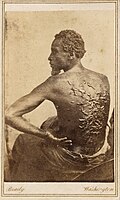Emancipation Proclamation
Emancipation Proclamation is a significant historical document in the United States, issued by President Abraham Lincoln during the American Civil War. It declared that all enslaved people in the Confederate-held territory were to be set free. This did not end slavery in the entire nation but was a significant step towards the abolition of slavery.
Background[edit]
The Emancipation Proclamation was issued on January 1, 1863, during the second year of the American Civil War. It was a presidential proclamation and executive order. The proclamation declared "that all persons held as slaves" within the rebellious states "are, and henceforward shall be free."
Impact[edit]
The Emancipation Proclamation had a significant impact on the Civil War and the future of the United States. It changed the federal legal status of more than 3.5 million enslaved African Americans in the Confederate states from slave to free. It also allowed African Americans to join the Union Army and Navy, providing the Union with a new source of manpower.
Criticism and Controversy[edit]
Despite its significance, the Emancipation Proclamation has been criticized for only freeing slaves in the Confederate-held territories and not in the Union-held territories. It has also been argued that the proclamation did not actually free any slaves, but rather, it was the Union victory in the Civil War that led to the abolition of slavery.
Legacy[edit]
The Emancipation Proclamation is considered a landmark document in American history. It paved the way for the passage of the Thirteenth Amendment, which officially abolished slavery in the United States.
See Also[edit]
References[edit]
<references />
|
|
|
-
Emancipation Proclamation
-
Abraham Lincoln
-
Emancipation Proclamation
-
Emancipation Proclamation
-
Gordon, scourged back
-
A Ride for Liberty -- The Fugitive Slaves
-
Emancipation Proclamation
-
Men of Color Civil War Recruitment Broadside 1863
-
Emancipation Proclamation
-
Emancipation Proclamation
-
Emancipation Proclamation
-
A Visit from the Old Mistress
Ad. Transform your life with W8MD's Budget GLP-1 injections from $75


W8MD offers a medical weight loss program to lose weight in Philadelphia. Our physician-supervised medical weight loss provides:
- Weight loss injections in NYC (generic and brand names):
- Zepbound / Mounjaro, Wegovy / Ozempic, Saxenda
- Most insurances accepted or discounted self-pay rates. We will obtain insurance prior authorizations if needed.
- Generic GLP1 weight loss injections from $75 for the starting dose.
- Also offer prescription weight loss medications including Phentermine, Qsymia, Diethylpropion, Contrave etc.
NYC weight loss doctor appointmentsNYC weight loss doctor appointments
Start your NYC weight loss journey today at our NYC medical weight loss and Philadelphia medical weight loss clinics.
- Call 718-946-5500 to lose weight in NYC or for medical weight loss in Philadelphia 215-676-2334.
- Tags:NYC medical weight loss, Philadelphia lose weight Zepbound NYC, Budget GLP1 weight loss injections, Wegovy Philadelphia, Wegovy NYC, Philadelphia medical weight loss, Brookly weight loss and Wegovy NYC
|
WikiMD's Wellness Encyclopedia |
| Let Food Be Thy Medicine Medicine Thy Food - Hippocrates |
Medical Disclaimer: WikiMD is not a substitute for professional medical advice. The information on WikiMD is provided as an information resource only, may be incorrect, outdated or misleading, and is not to be used or relied on for any diagnostic or treatment purposes. Please consult your health care provider before making any healthcare decisions or for guidance about a specific medical condition. WikiMD expressly disclaims responsibility, and shall have no liability, for any damages, loss, injury, or liability whatsoever suffered as a result of your reliance on the information contained in this site. By visiting this site you agree to the foregoing terms and conditions, which may from time to time be changed or supplemented by WikiMD. If you do not agree to the foregoing terms and conditions, you should not enter or use this site. See full disclaimer.
Credits:Most images are courtesy of Wikimedia commons, and templates, categories Wikipedia, licensed under CC BY SA or similar.
Translate this page: - East Asian
中文,
日本,
한국어,
South Asian
हिन्दी,
தமிழ்,
తెలుగు,
Urdu,
ಕನ್ನಡ,
Southeast Asian
Indonesian,
Vietnamese,
Thai,
မြန်မာဘာသာ,
বাংলা
European
español,
Deutsch,
français,
Greek,
português do Brasil,
polski,
română,
русский,
Nederlands,
norsk,
svenska,
suomi,
Italian
Middle Eastern & African
عربى,
Turkish,
Persian,
Hebrew,
Afrikaans,
isiZulu,
Kiswahili,
Other
Bulgarian,
Hungarian,
Czech,
Swedish,
മലയാളം,
मराठी,
ਪੰਜਾਬੀ,
ગુજરાતી,
Portuguese,
Ukrainian














